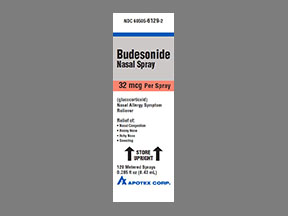
Rhinocort Allergy Coupons & Discount Card – Guaranteed Prices from $2.47
budesonide
My prescription
Edit
8.43ML of 32MCG/ACT, Budesonide (1 Bottle)
Select pharmacy

Walgreens
$2.47
COUPON PRICERhinocort Allergy savings card
Show this card to your pharmacist
Walgreens
$2.47
BIN
ID
PCN
GRP
019876
LHE4041D1C
CHIPPO
LHX
Powered by
More prescriptions for allergic rhinitis
More prescriptions for allergic rhinitis
Rhinocort Allergy dosage forms
| Dosage | Quantity | Price from | Per unit |
|---|---|---|---|
| 8.43ML of 32MCG/ACT | 1 Bottle | $2.47 | $2.47 |
Rhinocort Allergy Warnings
The following safety and warning details outline the essential precautions and potential risks associated with the use of budesonide (Rhinocort Allergy). It is crucial to review this information thoroughly and discuss any concerns with your healthcare provider.
Nose Bleeds and Nasal Injury: Usage of budesonide may lead to nose bleeds and potential damage to the nasal tissue, which can result in serious injury to the nasal septum. Healing of nasal injuries or damage may also be impaired. Increased risk if you have nasal surgery, a nose injury, or nasal ulcers.
Increased Infection Risk: Budesonide is a corticosteroid that may suppress your immune system, elevating the risk of infections such as fungal infections in the nasal or throat areas and viral infections like chickenpox. This is particularly a concern if used over several months or alongside other immune-weakening medications.
Altered Stress Hormone Levels: Prolonged or excessive use of budesonide can lead to systemic absorption of the medication, impacting cortisol levels, a natural stress hormone. Caution is advised if the medication is used for extended periods or in high doses.
Delayed Growth in Children: Long-term use of budesonide in children may result in slowed growth. It is advised to use the smallest effective dose for the shortest duration necessary. Consult a pediatrician to ensure the medication is suitable for your child.
Allergic Reactions: There is a possibility of severe allergic reactions to budesonide, including life-threatening symptoms such as facial swelling and anaphylaxis. Immediate medical attention is required if symptoms like hives, rash, swelling, or breathing difficulties occur.
Eye and Vision Problems: Budesonide may increase intraocular pressure, potentially leading to glaucoma or cataracts. Individuals with a history of these eye conditions should consult an eye specialist before use and monitor for any vision changes during treatment.
No specific contraindications are provided for budesonide (Rhinocort Allergy). Always consult with your healthcare provider for personalized advice and guidance.
Rhinocort Allergy Side Effects
When taking this medication, some individuals may experience common side effects, which are generally mild. These include a bloody nose occurring in about 8% of users and a sore throat in approximately 4%. While these symptoms are usually not concerning, it's advisable to consult your healthcare provider if they persist or worsen.
There are also other side effects that some users have reported. These may include difficulty breathing, a persistent cough, and irritation in the nose. It's important to monitor these symptoms and reach out to your healthcare provider if they occur, especially if they become severe.
In rare cases, serious side effects can occur that require immediate medical attention. These include severe allergic reactions characterized by hives, a rash, swelling of the face, lips, tongue, or throat, and trouble breathing. If you experience any of these symptoms, it is crucial to seek urgent medical care to ensure your safety.
What is the generic name for Rhinocort Allergy?
The generic name for Rhinocort Allergy is budesonide.
Is Rhinocort the same as Flonase?
Rhinocort and Flonase are not the same, although both are nasal sprays used to treat allergy symptoms. Rhinocort contains budesonide, while Flonase contains fluticasone propionate. Both are corticosteroids, but they have different active ingredients.
Did they discontinue Rhinocort?
Rhinocort has not been discontinued. It is still available as an over-the-counter nasal spray for the treatment of nasal allergy symptoms. However, availability may vary by location and specific formulations, so it is advisable to check with local pharmacies or healthcare providers for the most current information.
Is Rhinocort good for allergies?
Rhinocort, which contains the active ingredient budesonide, is a nasal spray that is effective in treating symptoms of allergic rhinitis, such as nasal congestion, sneezing, and runny nose. It is commonly used to manage allergies and is generally considered effective for this purpose. However, it is important for individuals to consult with a healthcare provider to ensure it is appropriate for their specific condition and to discuss any potential side effects.
Who should not use Rhinocort?
Rhinocort should not be used by individuals who are allergic to budesonide or any of the ingredients in the medication. It is also not recommended for those with untreated fungal, bacterial, or viral infections, particularly in the nasal passages. Additionally, individuals with a history of tuberculosis or those who have recently had nasal surgery or injury should consult a healthcare provider before using Rhinocort. Pregnant or breastfeeding women should also seek medical advice prior to use.
